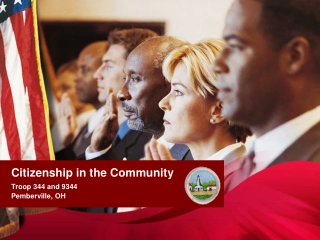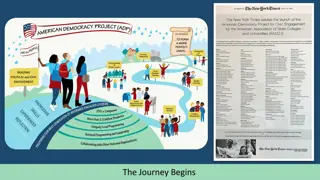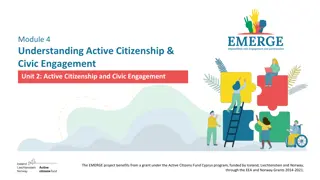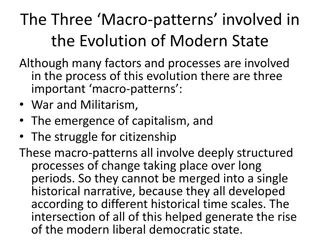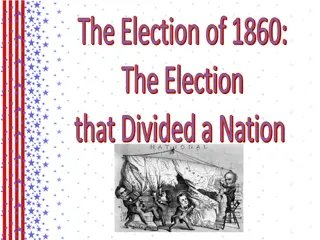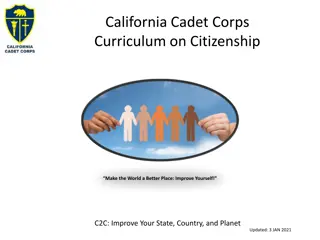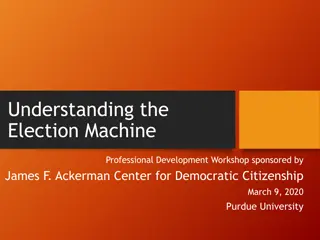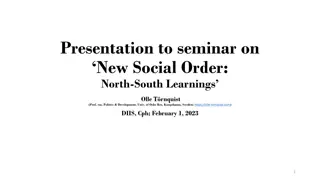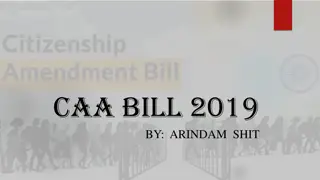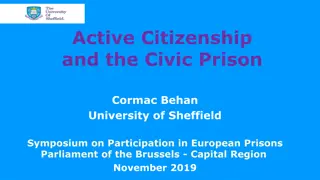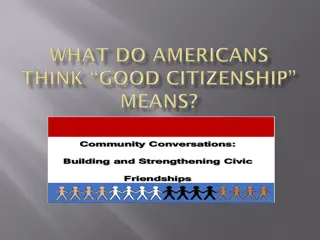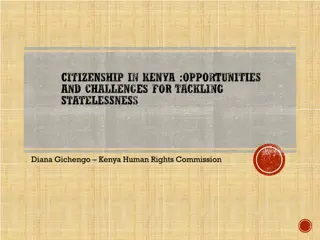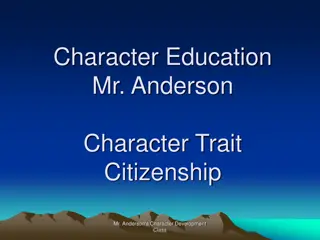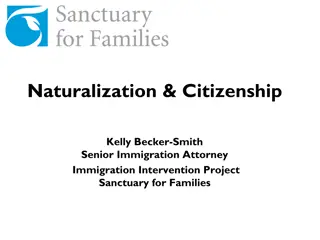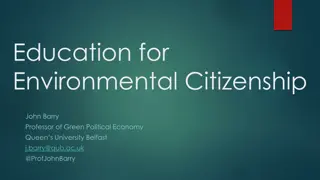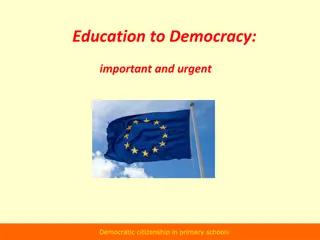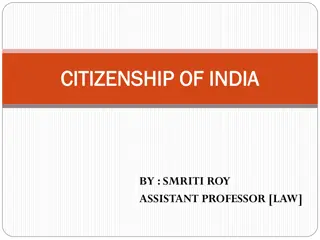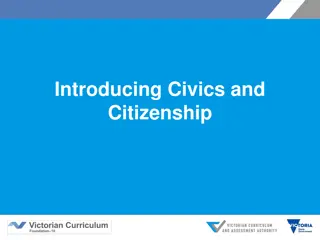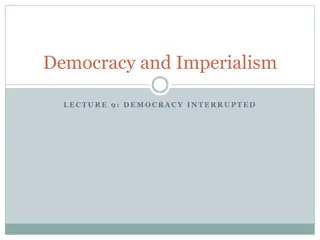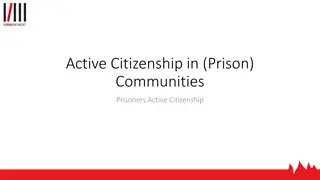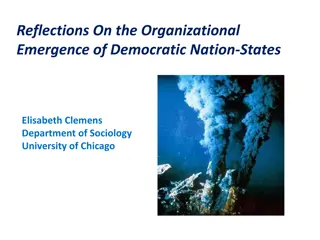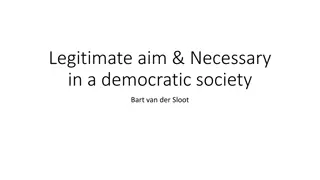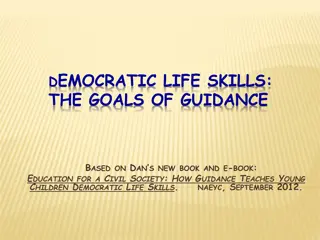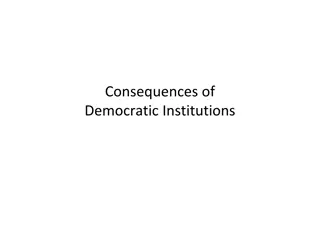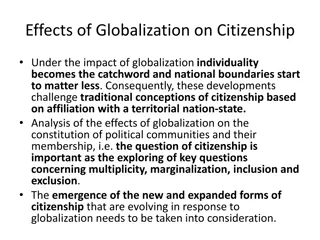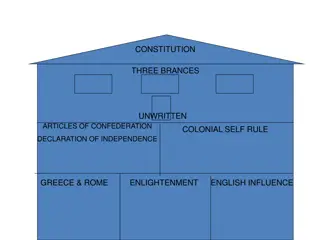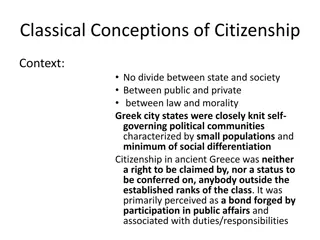Citizenship in the Community Merit Badge Requirements
Explore the Citizenship in the Community Merit Badge requirements focusing on understanding the rights, duties, and obligations of being a good citizen in your community. From discussing what citizenship means to volunteering at charitable organizations, this badge encourages active participation in
0 views • 45 slides
Developing Good Citizenship Values among Citizens by Citizenship Education Team
Good citizenship entails obeying laws, fostering civic intelligence, responsibility, and participation, being active in governance, showing cooperation, self-control, law obedience, loving one's country, and promoting unity to build a better society. These qualities are nurtured through civic educat
6 views • 15 slides
The Journey Begins
Initiatives like Voter Education, Deliberative Dialogue, and addressing Global Challenges are pivotal in fostering civic engagement and informed citizenship. The Theory of Change underscores the importance of integral, relational, organic, and generative approaches in democratic engagement efforts,
0 views • 16 slides
Understanding Active Citizenship & Civic Engagement: Definitions and Importance
Encouraging citizens and organizations to actively participate in civil society and decision-making processes is vital for a democratic society. Active citizenship involves participation in public affairs, civil society, and political life with a focus on human rights, democracy, and community well-
1 views • 22 slides
Effects of Globalization on Citizenship: A Critical Analysis
Under the impact of globalization, traditional conceptions of citizenship based on national boundaries are being challenged, leading to the emergence of new forms of citizenship. Globalization questions the authority of nation-states over citizenship and democracy, highlighting the interconnectednes
0 views • 14 slides
Evolution of Modern State: Three Macro-Patterns Explored
The evolution of the modern state is influenced by three key macro-patterns: War and Militarism, Emergence of Capitalism, and Struggle for Citizenship. These patterns involve deep processes of change over long periods, contributing to the development of modern liberal democratic states. War and Mili
0 views • 13 slides
Ancient Greek Conceptions of Citizenship by Aristotle
Ancient Greek conceptions of citizenship, as discussed by Aristotle, emphasized the close-knit nature of city-states, where citizenship was a bond forged by active participation in public affairs. Citizenship was viewed as a privilege, exclusive in nature, with a strong emphasis on civic virtue, tru
0 views • 9 slides
Critique of Universal and Differentiated Citizenship
Universal citizenship embodies equality of rights for all citizens, while differentiated citizenship focuses on special representation rights for oppressed groups. Iris Marion Young criticizes the universalism in citizenship, advocating for differentiated citizenship to address the needs of marginal
2 views • 10 slides
Aristotle's Justification of Hierarchy and Republican Aspects of Citizenship
Aristotle's concept of citizenship involves a hierarchical structure where ruling and being ruled in turn is essential. He justifies this hierarchy by emphasizing the advantageous nature of ruling and being ruled. However, his views on citizenship in Greek city-states were limited to adult males, hi
3 views • 6 slides
The Election of 1860: A Divisive Campaign for the Future of the United States
The 1860 election was a significant moment in American history, marked by ideological divisions and the rise of Abraham Lincoln. The Republican Party, Southern Democratic Party, Democratic Party, Northern Democratic Party, and Constitutional Union all played crucial roles in shaping the outcome. The
1 views • 14 slides
Evolution of Citizenship in Liberal Democracy
Citizenship within liberal democracy entails equal rights, duties, liberties, and constraints for individuals within a political community. The entrenchment of civil and political rights has shaped the struggle for membership and participation in political communities. Civil rights, essential for in
1 views • 11 slides
California Cadet Corps Curriculum on Citizenship - Make the World a Better Place!
In the California Cadet Corps Curriculum on Citizenship, cadets learn about active citizenship and how to improve their state, country, and planet. The unit objectives focus on defining active citizenship, understanding rights and responsibilities, volunteering effectively, and more. Active citizens
0 views • 39 slides
Evolution of Liberal Citizenship Theory
The liberal theory of citizenship emphasizes the essential components of right, responsibility, and identity within a political community. It contrasts with pre-capitalist societies by offering a weak sense of membership and reduced citizen obligations. The addition of social rights has brought an e
0 views • 15 slides
Election Machine Professional Development Workshop at Purdue University
Explore the Election Machine Professional Development Workshop held at Purdue University, sponsored by the James F. Ackerman Center for Democratic Citizenship. The workshop focused on Teaching Elections and featured insights on the importance of fact-based analysis, economics in presidential electio
3 views • 63 slides
Social Democratic Politics: Pillars and Strategies for Transformation
Social democratic politics is rooted in democratic collectivities and rights, aiming to reshape capitalism through reform, regulation, and transformative strategies. Olle Törnquist delves into the historical foundations and the need for comprehensive reforms to challenge the dominant logics of capi
3 views • 10 slides
Overview of Citizenship Amendment Act, 2019
The Citizenship Amendment Act, 2019 aims to provide Indian citizenship to illegal refugees belonging to six communities from Pakistan, Bangladesh, and Afghanistan. It reduces the residency requirement for acquiring citizenship to 5 years and allows for identification and potential deportation of ill
0 views • 8 slides
Reimagining Citizenship in Prison: Active Civic Engagement and Rights
Explore the intersection of citizenship and incarceration, focusing on the concept of active citizenship within prison settings. Delve into the importance of civic engagement, prisoner rights, and the evolving mosaic of citizenship, highlighting avenues for volunteering, accountability, and reintegr
2 views • 16 slides
Understanding Citizenship Through Aristotle's Four Aspects
Aristotle's concept of citizenship involves balancing individual autonomy, participation in public affairs, state authority, and social relations. A 2004 survey explored different dimensions of citizenship like participation, autonomy, adherence to social order, and solidarity. The data from the sur
0 views • 15 slides
Understanding Citizenship and Immigration in Modern Democracies
Citizenship, a fundamental institution of modern democracies, defines the relationship between individuals and the state through reciprocal rights and duties. However, citizenship has a dual nature, serving to both include certain individuals as citizens and exclude others. Immigrants residing withi
0 views • 21 slides
Understanding Citizenship in Kenya: Opportunities and Challenges
Exploring the acquisition of Kenyan citizenship through birth and registration, including eligibility criteria, processes, and implications. The article delves into citizenship by birth, registration, marriage, and special cases like children of Kenyan citizens by registration, shedding light on the
0 views • 17 slides
Understanding Citizenship and Civic Duty in Mr. Anderson's Character Development Class
Explore the concept of citizenship and civic duty in Mr. Anderson's Character Development Class, focusing on being a good member of the community, respecting authority, obeying rules, and working towards a better society. Learn how individuals can uphold their civic responsibilities by honoring fair
0 views • 26 slides
Complete Guide to US Citizenship and Naturalization Process
Discover essential information on US citizenship and the naturalization process, including common acronyms, ways to obtain citizenship, benefits of becoming a US citizen, steps to apply for naturalization, and key details about the N-400 form. Learn about the significant advantages of US citizenship
0 views • 49 slides
Cultivating Environmental Citizenship and Conflict Transformation Skills
Encouraging education for environmental citizenship, this presentation delves into the need for changes in lifestyle, production, and consumption to combat environmental degradation. Emphasizing the importance of understanding numeracy, statistics, and conflict management skills, it advocates for no
0 views • 14 slides
Importance of Democratic Citizenship Education in Primary Schools
Promoting democratic citizenship education in primary schools is essential for fostering a sense of community, conflict resolution skills, empathy, and embracing diversity among students. The curriculum focuses on themes like group cohesion, conflict resolution, communication, empathy, community par
0 views • 9 slides
Understanding Indian Citizenship Law
Indian citizenship is defined by the relationship between individuals and the state, with principles such as jus soli and jus sanguinis determining eligibility. The Indian Citizenship Act of 1955 outlines the rights and procedures for acquiring citizenship, including provisions for migrants from Pak
0 views • 23 slides
Understanding Civics and Citizenship in Victorian Curriculum
Explore the aims, structure, and key messages of Civics and Citizenship in the Victorian Curriculum, focusing on developing students' understanding of democratic principles, civic engagement, and responsible participation in society. The curriculum emphasizes civic identity, rights and responsibilit
0 views • 6 slides
Exploring Values Education in Nordic Preschools
This study delves into the perception and handling of values in Nordic preschools, focusing on caring, disciplinary, and democratic values. It aims to uncover whether conflicting or co-existing values prevail within individual preschools and across Nordic countries. Definitions of values, including
0 views • 16 slides
Challenges to Democracy: An Historical Perspective
Explore the historical instances of democracy being interrupted in Ancient Athens, from the Periclean Peloponnesian War to the oligarchic regimes of 411 and 403 BC. Delve into the reasons behind the dissolution of democracy, the responses of Athenians to such interruptions, and the oligarchs' aims t
0 views • 24 slides
Promoting Active Citizenship in Prison Communities
Encouraging active citizenship within prison communities involves engaging prisoners in meaningful activities, fostering skills and empowerment, enhancing morale and relationships, and preparing individuals for reintegration into society. Initiatives such as promoting reading, organizing leisure act
0 views • 19 slides
Dynamics of Democratic Nation-States and Organizational Change
Insights on the emergence of democratic nation-states, the role of networks in democratic revolutions, challenges in defining democratic governance, and the impact of redundancy on organizational stability and change are explored in this thought-provoking discussion by Elisabeth Clemens.
0 views • 25 slides
Democratic Lawmaking in the EU: Promises and Pitfalls of the Ordinary Legislative Procedure
This presentation explores the evolution and impact of the Ordinary Legislative Procedure (OLP) in the European Union, discussing its democratic innovations and achievements post-Lisbon. Topics covered include the implementation of OLP, its democratic implications, and the use of trilogues as negoti
0 views • 11 slides
Legitimate Aims in a Democratic Society - Exam Preparation Overview
Exam preparation on legitimate aims in a democratic society focusing on Article 8 of the ECHR, including the right to respect private and family life, security concerns, national security, public safety, prevention of disorder or crime, and more. The content covers necessary aspects for understandin
0 views • 70 slides
Challenges of Democratic Governments in Economic Policy Making
Democratic governments face challenges when enacting economic policies due to the influence of voter participation, special interest politics, and the limitations of majority rule. This presentation explores the complexities of democratic decision-making in economic matters, examining the impact of
0 views • 20 slides
Nurturing Democratic Life Skills in Children: A Guide to Promoting Positive Development
Explore the concept of Democratic Life Skills (dLS) and the essential guidance needed to cultivate these skills in young children. Learn about the educational outcomes for a democratic society and the historical and psychological roots of dLS. Discover how to support children in finding acceptance,
0 views • 14 slides
Analysis of Democratic Dominance in Presidential Elections and Potential Senate Seat Flips in 2016
Democratic candidates have consistently won Democratic stronghold states in presidential elections since 1992, securing a significant portion of the Electoral College votes. Meanwhile, Republicans face challenges in holding onto Senate seats in states like Illinois, Wisconsin, New Hampshire, Pennsyl
0 views • 8 slides
Russian Economic Warfare in Central and Eastern Europe: Challenges and Impacts
Russia employs overt and covert economic warfare tactics in Central and Eastern Europe, including energy blockages and media manipulation. This strategy poses challenges to democratic values and institutions. The study examines the correlation between Russia's economic footprint and democratic stand
0 views • 24 slides
Perspectives on Democratic Institutions: Majoritarian vs. Consensus Vision
Democratic institutions have consequential impacts on political representation, economic policy, ethnic conflict, and democratic survival. Two distinct visions, majoritarian and consensus, shape the distribution of power in governance. The majoritarian vision concentrates power in the hands of the m
0 views • 112 slides
Effects of Globalization on Citizenship and Contemporary Globalization
The impact of globalization challenges traditional notions of citizenship tied to nation-states, leading to new forms of citizenship evolving in response. Globalization questions themes of citizenship, identity, and democracy, deepening the interconnectedness of local, national, and global events. F
0 views • 18 slides
Foundations of Democratic Governance: From Ancient Roots to Modern Principles
Explore the evolution of democratic governance from the foundations laid in Ancient Greece and Rome to the core principles of Enlightenment thinkers and English influences, culminating in the establishment of democratic principles in the Declaration of Independence and the American Constitution. Dis
0 views • 10 slides
Ancient Greek Citizenship and Aristotle's Views
In ancient Greece, citizenship was a bond forged through participation in public affairs, with emphasis on duties and responsibilities rather than rights. Aristotle's views on citizenship emphasized active political participation, civic virtue, and exclusivity. Citizens were those involved in the ci
0 views • 7 slides
